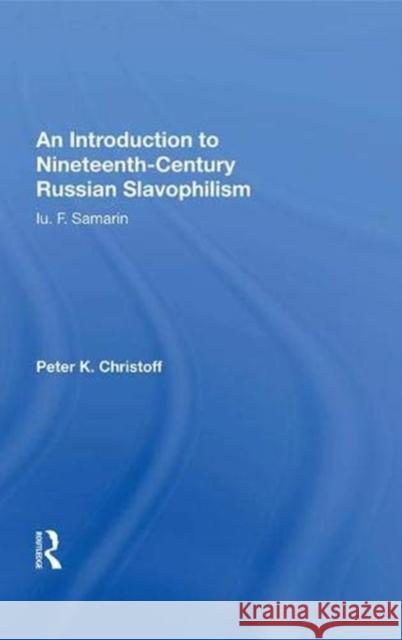An Introduction to Nineteenth-Century Russian Slavophilism: Iu. F. Samarin » książka
An Introduction to Nineteenth-Century Russian Slavophilism: Iu. F. Samarin
ISBN-13: 9780367015886 / Angielski / Twarda / 2019 / 480 str.
An Introduction to Nineteenth-Century Russian Slavophilism: Iu. F. Samarin
ISBN-13: 9780367015886 / Angielski / Twarda / 2019 / 480 str.
(netto: 676,35 VAT: 5%)
Najniższa cena z 30 dni: 654,86
ok. 22 dni roboczych.
Darmowa dostawa!
This work is the fourth volume of Peter Christoff’s study of nineteenth-century Russian Slavophilism, which grew out of vigorous and prolonged debates between the Slavophils and proponents of Slavophilism’s principal ideological rival, Westernism, in the mid-nineteenth century. As the names indicate, the Westerners looked to the West for the solution to Russia’s political, social, and economic problems. The Slavophils, well-to-do members of the Russian gentry who knew the West well, chose to look inward. Both Slavophils and Westerners favored emancipation of the Russian serfs, which was finally achieved in 1861. In this crucial reform, the Slavophils—Iu. F. Samarin in particular — played a leading role. Since the beginning of glasnost’ and perestroika, Slavophilism has been experiencing a revival in the Soviet Union expressed in a number of ways, including the announced republication of the works of A. S. Khomiakov and I. V. Kireevsky. The original Slavophil circle included these two senior Slavophils as well as K. S. Aksakov and Samarin (1819–1876). Samarin was the youngest and most active of the Moscow Slavophils. Endowed with an exceptional mind and character, he was fluent in several languages and attracted attention while still a young student at Moscow University. He played a leading role in the emancipation of the serfs and in other reforms, sometimes risking his own safety. He left more than eleven volumes of collected works and correspondence—the largest written legacy among the early Slavophils and an invaluable source for the study of Moscow Slavophilism as well as Samarin’s life and activities.











